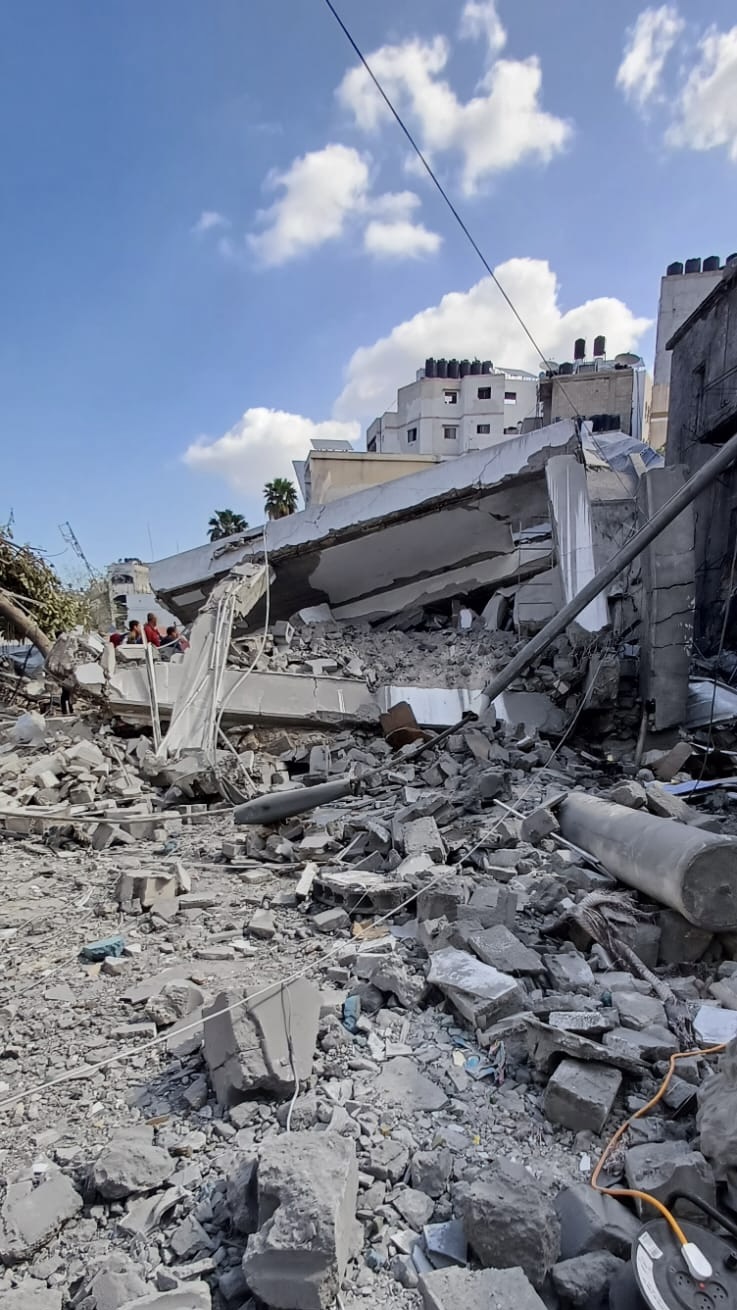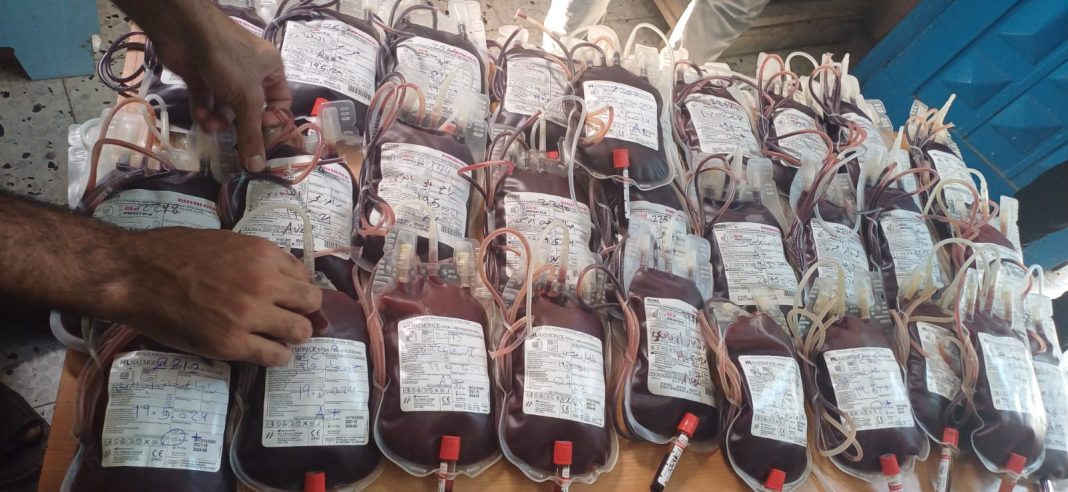CW: Violence, Death, Injury
Buying gowns, completing reading lists, googling the meanings of obtuse college lingo: this is what the weeks before starting a degree at Oxford University are like for most students. The reality could not be more different for Samah*, a Palestinian student in Gaza who holds an offer to study Genomic Medicine (MSc) at Balliol College.
“Life in Gaza is centred entirely around survival”, she tells me. “Each day brings deep uncertainty; where to find clean water, how to stay safe, and how to secure anything at all to eat. The idea of ‘food’ has become secondary at this point, we’re simply trying to find anything to sustain ourselves.”
Samah is squeezing in time to talk to me during a short break on her nightshift in the emergency unit of a hospital. She has just urgently transferred two units of blood to a patient undergoing an above-knee amputation. His injuries are critical and she thinks he may not survive until morning. “This is our reality: responding to mass casualties daily, trying to help however we can, while carrying our own personal trauma.”
“After such shifts, we return to ask ourselves the same questions: where can we rest, is there anything to eat, and is there anywhere less dangerous to go?”
For Loay*, who holds an offer to study Health Service Improvement and Evaluation (MSc) at St Hilda’s College, life is just as perilous. Israel’s ongoing military offensive and blockade of aid trucks have resulted in him and his family being displaced 18 times.
“The impact of the war has been devastating”, he tells me once he finds a few bars of precious internet connection. “I have lost my uncle, my cousin, and four close friends. These are not just numbers. They were people I loved, studied, and grew up with. The psychological toll of witnessing so much loss, destruction, and suffering is immense.”
Samah and Loay are two of 38 students in Gaza with full scholarships to study at UK universities. After succeeding against the odds, they have found that they are unable to make the journey to begin their courses this September. In order to obtain visas, the students must complete fingerprint and photo registration, but the only UK government authorised biometrics centre in Gaza closed in October 2023. After the closure of the Rafah border crossing in May 2024, a total of approximately 78 UK offer holders are stuck in Gaza. As well as Samah and Loay, Cherwell is aware of another Oxford offer, Salam*, who is unable to obtain a visa.
This is only the latest roadblock in the students’ journey to Oxford. “Education in Gaza has always faced significant challenges, even before the war”, Samah explains. Shortages in resources, frequent electricity cuts, and restricted access to academic tools have always been a reality of her educational experience. But with the outbreak of war in October 2023, she says “the situation became catastrophic”. Israeli forces have damaged or destroyed more than 90% of schools and universities in Gaza, with many students forced to pause or abandon their studies altogether. Loay had just graduated medical school when war broke out. “I was due to start my role as a teaching assistant at the Faculty of Medicine”, he recalls, “but unfortunately, the university was completely destroyed.”
In Samah’s case, she struggled to complete her studies at the Islamic University of Gaza during the war whilst working in the laboratory and bloodbank unit of the Ahli Arab Hospital. “We operated around the clock, 24 hours a day. It’s difficult to describe how overwhelming this period was, I often had no time to eat, sleep, study or even think. Every minute was spent trying to rescue injured patients.” She describes stealing what moments she could to sit on a bench in the microbiology department to study and complete assignments.

“Applying to Oxford during the war was incredibly challenging”, Loay explains when I ask him about the process. “Due to the severe damage to Gaza’s infrastructure, I had very limited access to the internet and often found myself completing applications from hospital corridors, where I could occasionally connect.”
For both Samah and Loay, it was a desire to help others that drove them to undertake such a massive effort. “I’ve long been passionate about molecular and genetic medicine”, Samah tells me. “It encompasses vital areas like cancer therapy, IVF, and screening for congenital diseases, all of which are critically needed in my community.” Loay tells me that an MSc in Health Service aligns perfectly with his goal of strengthening healthcare delivery in crisis and low-resource settings such as Gaza. As for why this university in particular? “I want to study at Oxford because it’s Oxford! It offers world-class academic training, especially in health systems and policy.”
When the news of her success came, Samah says it “felt like a light at the end of the tunnel”, giving her a renewed sense of purpose. But today, this joy is tainted by the uncertainty of her current situation. “Not being able to obtain the visa means everything is at risk for over 40 students from Gaza, our lives, dreams, and hopes can be lost in a matter of seconds.”
The UK has the same ability to act. We are not asking for special treatment. We are asking for a safe and practical solution to access the opportunities we’ve earned.
Loay’s desperation is palpable. “I’ve worked hard for my place at Oxford, but the lack of a functioning biometric centre and the impossibility of safe travel from Gaza have left me stuck in a situation I cannot control.” He points to the fact that other nations such as the Republic of Ireland, France, and Italy have coordinated with Israel to evacuate students from Gaza. “The UK has the same ability to act. We are not asking for special treatment. We are asking for a safe and practical solution to access the opportunities we’ve earned.”
Samah and Loay are not without hope. A campaign, headed by the activist group Gaza 40, has sprung up to publicise their cause. The organisation calls for the UK government to allow the students to defer the provision of biometric data until they have made safe passage out of Gaza. Over 70 MPs have signed a letter to Prime Minister Keir Starmer calling on the government “to coordinate an urgent evacuation route for this group of students”. They highlight that similar exceptions over biometric data were made previously for Ukrainian students. Recently, the government committed to evacuating nine students from Gaza whose scholarships are funded by the Foreign Office. Regarding the remaining scholars, the government has stated that it is “aware of these students and are considering how we can best support”.
As for Oxford University, both Samah and Loay say that they felt supported by the administration, who provided a letter of support and have reached out to the government about the issue. However, they also expressed their belief that the University could be doing more to raise awareness and place pressure on the government. A spokesperson for Oxford University told Cherwell: “The University is part of sector-wide efforts to support the arrival of students from Gaza and are in contact with our offer-holders who are facing the greatest difficulty. We hope to welcome several students from Gaza on full scholarships this autumn.”
For Samah and Loay, whose lives are shaped by displacement, food insecurity, and the bombs of the Israeli military, everything is in a dangerous state of flux; nothing can be taken for granted. However, one thing is certain: the new academic year is fast approaching and with it the possibility of losing the opportunity of a lifetime. Samah is all too well aware of this: “Here in Gaza, we live with the reality that everything we work for can suddenly vanish. That’s why this means so much to all of us.”
“Securing a visa is not just about travel. It represents a light of hope, a chance to rebuild what has been destroyed.”
*The surnames of the students have been omitted at their request.


